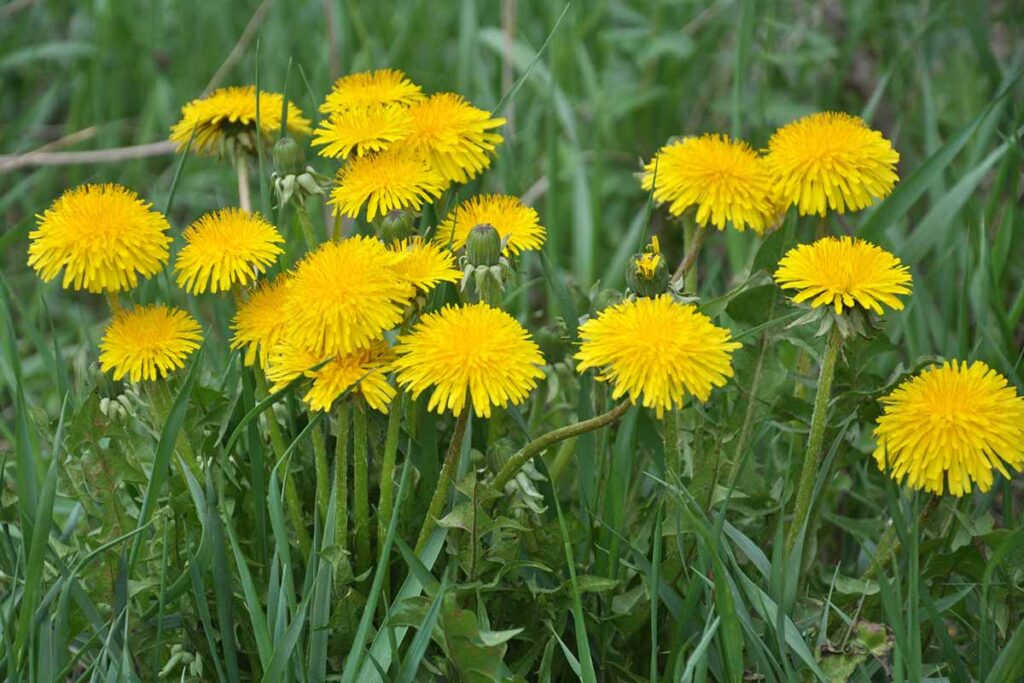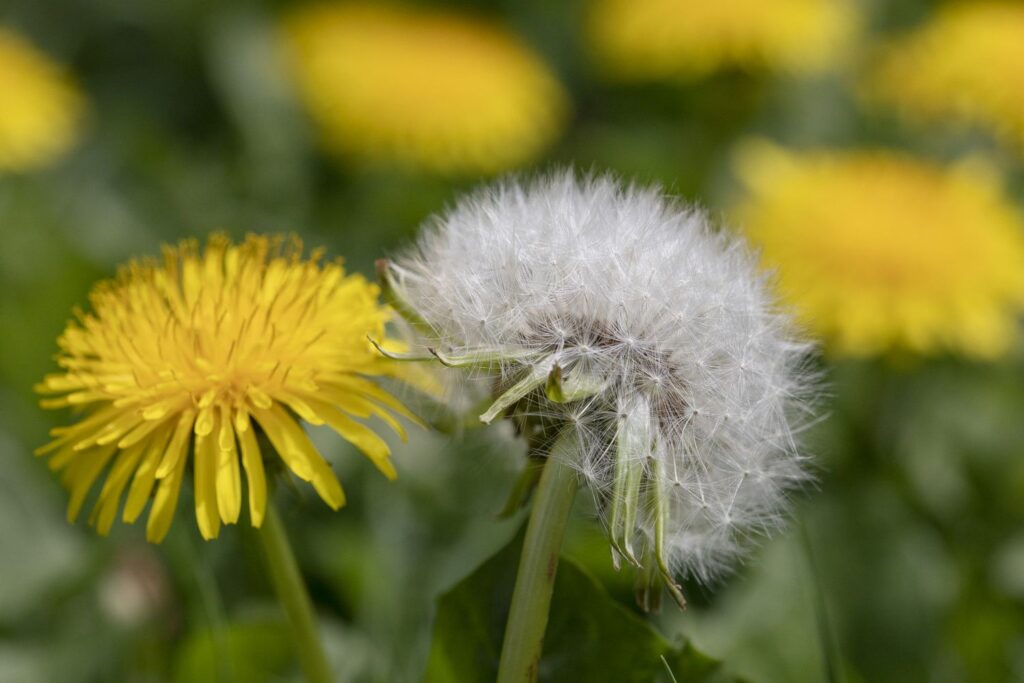Original Sources:
Materia Medica Monthly by Sajah Popham, founder of the School of Evolutionary Herbalism
The Earthwise Herbal Vol. I and II by Matthew Wood
The Book of Herbal Wisdom by Matthew Wood

Common Name: Dandelion, Blowball, Canker Wort, Irish Daisy, Lion’s Tooth, Puffball, Wild Endive, Chicoria, Conuelda, Priest’s Crown, Swine’s Snout
Latin Name: Taraxacum officinale, Taraxacum vulgare, Taraxacum ceratophorum (Native to Canada and western US) Greek: Leontodon taraxacum (Linn), Former binomial name: Taraxacum densleonis
Family: Asteraceae
Parts Used: Roots (fall), leaves (spring and summer), and flowers (spring and summer)
Geographical Distribution: Dandelion has been utilized all over Europe, Asia, and North America throughout the centuries. It grows all around the northern temperate hemisphere of the world. It can be seen growing in meadows and pastures, waste lands, and also mountainous country from subalpine to alpine areas. It flowers throughout the spring and summer months.
Taste: Bitter
Primary actions of Dandelion:
Alterative: Dandelion is an excellent general alterative with its gentle influence upon the kidneys, liver, and digestion. Dandelion helps with cooling down excess heat and eliminating excess fluids from the body. It works by supporting the natural cleansing functions of the kidneys and liver. It also increases blood flow to the tissues and helps with lymph drainage. This is really the essential action of this plant, with every other action describing the specific ways Dandelion is alterative.
Diuretic: Diuretics don’t just necessarily make you pee more, they actually help all of the cells to evacuate more water. They move excessive water from the organs and tissues, and drain them to the kidneys for elimination.
The advantage that Dandelion has over using diuretic medication is the fact that most medications are very mineral depleting. Dandelion, on the other hand, is very rich in minerals. It is particularly rich in potassium which is lost through excessive diuresis, so it’s a wonderful reliable diuretic herb to use instead of mineral depleting medications.
One thing that is important and interesting about many herbal diuretics, is that they tend to contain high amounts of potassium, which tends to be excreted in relatively high amounts in the urine due to its water solubility. It is common in conventional medicine to give patients with high blood pressure a “loop diuretic” which radically depletes the body’s store of potassium to dangerous levels, which is why they usually always give potassium pills along with the diuretics. Nature in all of her brilliance makes these herbal diuretics which innately have high levels of potassium to replenish what will be depleted through increasing urination. This is true of Dandelion leaf and Nettle (Urtica dioica).
Bitter Tonic: Dandelion is a fantastic bitter tonic, having a profound influence upon the upper and lower GI. When we ingest an herb like dandelion, the bitter taste sends signals to the brain, and then all the way down to our digestion. These signals initiate the production and secretion of more bile from both the liver and gallbladder, pancreatic enzymes, stomach secretions, as well as small and large intestine secretions. This action helps promote healthier assimilation along the entire digestive system, thus promoting a healthier functioning body overall. The strength of Dandelion is in fact its mildness in terms of how bitter it is.
Choleretic/Cholagogue: Choleretic means that the liver is stimulated to produce more bile, whereas the term cholagogue means bile is being pushed out of the liver or gallbladder. This is connected to the bitter taste of Dandelion.
Mild laxative: This action of Dandelion is also related to the bitter taste and is a result of the production of bile. Bile is our body’s natural laxative, so when we stimulate this action, we can see that our elimination is smoother and ever so slightly stimulated in the lower GI or bowels. Dandelion is a safe tonic herb, and thus should not stimulate the bowels uncomfortably like other more stimulant laxative herbs.
Pre-biotic: Dandelion root specifically contains some unique starches and soluble fibers that are rich in prebiotic sugars that feed the beneficial gut bacteria, also referred to as the “microbiome.” (Note: A prebiotic is most simply food for the beneficial bacteria, whereas probiotics are the beneficial bacteria.)
When these beneficial bacteria are in equilibrium, they maintain the integrity of the gut wall, reduce inflammation, provide immunological support and protection from pathogenic bacteria; as well as supporting overall proper digestion.
Physical Organs, Systems and Tissues: These are the primary organs, systems and tissues Dandelion has an affinity for.
Hepatobiliary system: Dandelion works through both sides of the liver: its digestive dynamics as well as its detoxification virtues. This affinity is associated with the bitter tonic action. The great herbalist Matthew Wood describes the “metabolic scenario” calling for the use of such a remedy in his Book of Herbal Wisdom: “the liver, the seat of metabolism, is not burning cleanly enough to remove all catabolic waste products, while the kidneys and skin are overburdened or are themselves incapable of removing these waste products.” Dandelion helps with all these processes.
Digestive system: Dandelion has a strong influence upon the digestive system. It has a direct impact upon the stomach, small and large intestines. Dandelion also acts upon the secondary organs of digestion through the liver and gallbladder, not only through stimulating secretions but also by rebuilding the gut flora through the presence of inulin present in fall-harvested roots (the prebiotic action described above).
Kidneys/Urinary system: Dandelion dispels toxins through the urine and kidneys by way of its diuretic action. While the roots and leaves have an influence here, the leaves are generally regarded as having a stronger affinity for the urinary tract, whereas the roots are often seen as more specific for the liver.
Blood and lymph system: The alterative action of Dandelion is where we see it shine in the lymph and immune system, as it works as a tonic to cleanse these “waters of the body”. As this herb is detoxifying internally, it has the ability to transform many topical skin conditions since toxic or impure blood cannot nourish or produce healthy skin. Its effects upon blood and lymph are not necessarily direct, but rather the results of its effects on the liver.
Energetics: Energetics give us a way to distinguish how a specific plant will affect the temperature, moisture, and tonal quality in a person. A plant’s temperature quality can either be warming or cooling. Its moisture quality can either be drying or moistening. Its tonal quality can either be relaxing or tonifying. There are of course plants that can be neutral in a certain quality.
The effect of Dandelion upon the temperature quality is that of being cooling.
As it has a wide range of alterative actions, over time Dandelion can have a net drying influence on the constitution. This makes sense when we consider it is a diuretic (fluids leaving via urinary tract), and bitter tonic/mild laxative (fluids leaving via bowels).
It has a slightly astringent influence upon the gastric mucosa. In general, Dandelion opens and loosens stagnation within the tissues, while at the same time is tonic, nutritive, and restorative.
Contraindications: Dandelion is an extremely safe herb. However, if you are allergic to plants in the Asteraceae family (Commonly referred to as the aster, daisy, composite, or sunflower family), you should not use Dandelion.
There are no known interactions Dandelion has with drugs, though one could assume that as a diuretic it would exacerbate the effects of thiazide or loop diuretics.
One of my favorite parts about spring is seeing all the Dandelions growing everywhere! Now I know many people spray their lawns for Dandelions, but I hope reading this blog makes you reconsider! To quote Wayne Dyer, “The only difference between a flower and a weed is a judgment”. Personally, I start my spring days by eating a few Dandelion flowers. It makes me feel more alive.
If you are interested in experiencing the power of this plant for yourself, check out our shop!
See you on the next post,
Patryk Chrzanowski
In-house Herbalist

